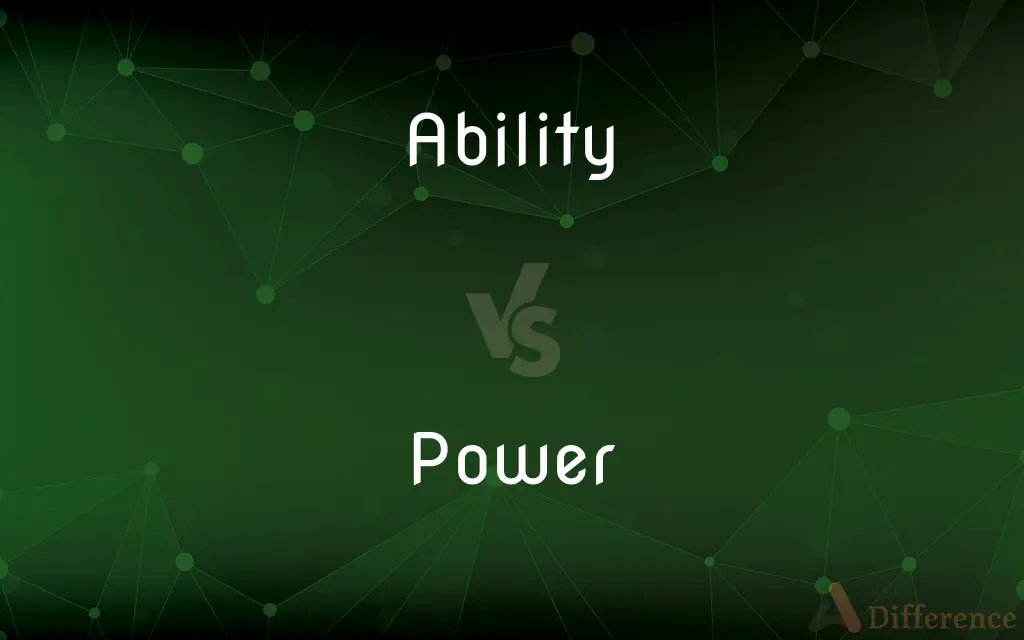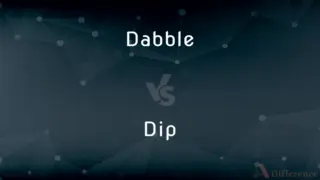Ability vs. Power — What's the Difference?
By Urooj Arif & Maham Liaqat — Updated on April 14, 2024
Ability refers to acquired skills and expertise for specific tasks, while power indicates the capacity to influence or control situations.

Difference Between Ability and Power
Table of Contents
ADVERTISEMENT
Key Differences
Ability is derived from learning and experience, focusing on personal or professional competencies such as playing an instrument or solving mathematical problems. Whereas power is often inherent or bestowed, related to one's position or resources, enabling them to exert influence over others or circumstances.
Abilities can be developed and improved over time through education and practice, enhancing one's effectiveness in specific areas. On the other hand, power can be positional or relational, not necessarily tied to personal skill, and can fluctuate based on changes in social or organizational structures.
Individuals exhibit abilities in varied contexts, demonstrating proficiency that can be measured and evaluated. Power, however, often manifests in social or hierarchical relationships, where the impact is more about control and less about direct skill application.
The concept of ability is usually associated with positive growth and personal development. In contrast, power can carry both positive and negative connotations, depending on how it is used—whether for leadership and protection or for domination and coercion.
While abilities are generally admired and encouraged in educational and professional settings, power dynamics are scrutinized for their ethical implications and effects on group dynamics and societal structures.
ADVERTISEMENT
Comparison Chart
Definition
Capability gained through knowledge and practice
Capacity to direct or influence behavior of others or course of events
Source
Personal development and experience
Positional authority, physical force, or societal norms
Measurement
Can be assessed through tests and performance evaluations
Often observed through effects and changes in behaviors and situations
Context
Mostly individual and specific to tasks
Broader, often involving groups or societal structures
Connotation
Generally positive, focuses on growth and competency
Can be positive or negative, associated with control
Compare with Definitions
Ability
Capacity to perform an act, either innate or as the result of learning and practice.
The surgeon’s ability to perform complex procedures grew with each surgery.
Power
The ability to influence others or events.
His position in the company gives him the power to influence the board’s decisions.
Ability
The state of being able to do something well or efficiently.
Her artistic abilities were evident in her beautiful paintings.
Power
A state or country possessing or exerting influence and control.
As a global power, the country plays a pivotal role in international affairs.
Ability
A talent or skill that allows someone to achieve a great deal.
His ability to solve complex problems makes him an invaluable team member.
Power
Physical might or force.
The power of the storm was terrifying.
Ability
Legal or financial competence.
The company’s ability to meet its financial obligations is unquestionable.
Power
Political or social authority or control.
The president wields significant power over the country’s policies.
Ability
Skill or proficiency acquired through training.
Her ability to speak multiple languages fluently impresses everyone.
Power
Electrical or mechanical energy.
The entire city was out of power after the storm.
Ability
Possession of the means or skill to do something
The manager had lost his ability to motivate the players
Power
The ability or capacity to do something or act in a particular way
His powers of concentration
The power of speech
I will do everything in my power to help you
Ability
Talent, skill, or proficiency in a particular area
Pupils of all abilities
A man of exceptional ability
Power
The capacity or ability to direct or influence the behaviour of others or the course of events
She had me in her power
A political process that offers people power over their own lives
Ability
The quality of being able to do something, especially the physical, mental, financial, or legal power to accomplish something.
Power
Physical strength and force exerted by something or someone
The lyrical power of his prose
The power of the storm
Ability
A skill, talent, or capacity
A student of many abilities.
Power
Energy that is produced by mechanical, electrical, or other means and used to operate a device
Generating power from waste
Power cables
Ability
The quality of being suitable for or receptive to a specified treatment
The ability of a computer to be configured for use as a file server. See Usage Note at able.
Power
The rate of doing work, measured in watts or less frequently horse power.
Ability
(obsolete) Suitableness.
Power
The product obtained when a number is multiplied by itself a certain number of times
2 to the power of 4 equals 16
Ability
(uncountable) The quality or state of being able; capacity to do or of doing something; having the necessary power.
This phone has the ability to have its software upgraded wirelessly.
This wood has the ability to fight off insects, fungus, and mold for a considerable time.
Power
A large number or amount of something
There's a power of difference between farming now and when I was a lad
Ability
The legal wherewithal to act.
Power
Supply (a device) with mechanical or electrical energy
A nuclear-powered submarine
The car is powered by a fuel-injected 3.0-litre engine
Ability
Physical power.
Power
Move or travel with great speed or force
He powered round a bend
Ability
(archaic) Financial ability.
Power
The ability or capacity to act or do something effectively
Is it in your power to undo this injustice?.
Ability
(uncountable) A unique power of the mind; a faculty.
Power
Often powers A specific capacity, faculty, or aptitude
Her powers of concentration.
Ability
(countable) A skill or competence in doing; mental power; talent; aptitude.
They are persons of ability, who will go far in life.
She has an uncanny ability to defuse conflict.
A mixed-ability class
Power
Physical strength or force exerted or capable of being exerted
The power of the waves.
Ability
The quality or state of being able; power to perform, whether physical, moral, intellectual, conventional, or legal; capacity; skill or competence in doing; sufficiency of strength, skill, resources, etc.; - in the plural, faculty, talent.
Then the disciples, every man according to his ability, determined to send relief unto the brethren.
Natural abilities are like natural plants, that need pruning by study.
The public men of England, with much of a peculiar kind of ability.
Power
Effectiveness at moving one's emotions or changing how one thinks
A novel of great power.
Ability
The quality of being able to perform; a quality that permits or facilitates achievement or accomplishment
Power
The ability or official capacity to exercise control; authority
How long has that party been in power?.
Ability
Possession of the qualities (especially mental qualities) required to do something or get something done;
Danger heightened his powers of discrimination
Power
The military strength or economic or political influence of a nation or other group
That country projects its power throughout the region.
Power
A country, nation, or other political unit having great influence or control over others
The western powers.
Power
A supernatural being
The powers of evil.
Power
Powers(Christianity) The sixth of the nine orders of angels in medieval angelology.
Power
The energy or motive force by which a physical system or machine is operated
Turbines turned by steam power.
A sailing ship driven by wind power.
Power
The capacity of a system or machine to operate
A vehicle that runs under its own power.
Power
Electrical or mechanical energy, especially as used to assist or replace human energy.
Power
Electricity supplied to a home, building, or community
A storm that cut off power to the whole region.
Power
(Physics) The rate at which work is done, expressed as the amount of work per unit time and commonly measured in units such as the watt and horsepower.
Power
The product of applied potential difference and current in a direct-current circuit.
Power
The product of the effective values of the voltage and current with the cosine of the phase angle between current and voltage in an alternating-current circuit.
Power
See exponent.
Power
The number of elements in a finite set.
Power
(Statistics) In a statistical test, the probability of correctly rejecting the null hypothesis when it is false.
Power
A measure of the magnification of an optical instrument, such as a microscope or telescope.
Power
Chiefly Upper Southern US A large number or amount. See Note at powerful.
Power
(Archaic) An armed force.
Power
Of or relating to political, social, or economic control
A power struggle.
A power base.
Power
Operated with mechanical or electrical energy in place of bodily exertion
A power tool.
Power car windows.
Power
Of or relating to the generation or transmission of electricity
Power companies.
Power lines.
Power
(Informal) Of or relating to influential business or professional practices
A pinstriped suit with a power tie.
Met with high-level executives at a power breakfast.
Power
To supply with power, especially mechanical or electrical power.
Power
The ability to do or undergo something.
Power
(social) The ability to coerce, influence, or control.
Power
(countable) The ability to affect or influence.
Power
Control or coercion, particularly legal or political (jurisdiction).
Power
The people in charge of legal or political power, the government.
Power
(metonymically) An influential nation, company, or other such body.
Power
An army, a military force.
Power
Effectiveness.
Power
Physical force or strength.
He needed a lot of power to hit the ball out of the stadium.
Power
Electricity or a supply of electricity.
After the pylons collapsed, this town was without power for a few days.
Power
A measure of the rate of doing work or transferring energy.
Power
The strength by which a lens or mirror magnifies an optical image.
We need a microscope with higher power.
Power
A large amount or number.
Power
Any of the elementary forms or parts of machines: three primary (the lever, inclined plane, and pulley) and three secondary (the wheel-and-axle, wedge, and screw).
The mechanical powers
Power
A measure of the effectiveness that a force producing a physical effect has over time. If linear, the quotient of: (force multiplied by the displacement of or in an object) ÷ time. If rotational, the quotient of: (force multiplied by the angle of displacement) ÷ time.
Power
(mathematics)
Power
A product of equal factors (and generalizations of this notion): , read as " to the power of " or the like, is called a power and denotes the product , where appears times in the product; is called the base and the exponent.
Power
(set theory) Cardinality.
Power
(statistics) The probability that a statistical test will reject the null hypothesis when the alternative hypothesis is true.
Power
In Christian angelology, an intermediate level of angels, ranked above archangels, but exact position varies by classification scheme.
Power
(transitive) To provide power for (a mechanical or electronic device).
This CD player is powered by batteries.
Power
(transitive) To hit or kick something forcefully.
Power
To enable or provide the impetus for.
Power
Impressive.
Power
Same as Poor, the fish.
Power
Ability to act, regarded as latent or inherent; the faculty of doing or performing something; capacity for action or performance; capability of producing an effect, whether physical or moral: potency; might; as, a man of great power; the power of capillary attraction; money gives power.
Power
Ability, regarded as put forth or exerted; strength, force, or energy in action; as, the power of steam in moving an engine; the power of truth, or of argument, in producing conviction; the power of enthusiasm.
Power
Capacity of undergoing or suffering; fitness to be acted upon; susceptibility; - called also passive power; as, great power of endurance.
Power, then, is active and passive; faculty is active power or capacity; capacity is passive power.
Power
The exercise of a faculty; the employment of strength; the exercise of any kind of control; influence; dominion; sway; command; government.
Power is no blessing in itself but when it is employed to protect the innocent.
Power
The agent exercising an ability to act; an individual invested with authority; an institution, or government, which exercises control; as, the great powers of Europe; hence, often, a superhuman agent; a spirit; a divinity.
And the powers of the heavens shall be shaken.
Power
A military or naval force; an army or navy; a great host.
Never such a power . . . Was levied in the body of a land.
Power
A large quantity; a great number; as, a power o good things.
Power
The rate at which mechanical energy is exerted or mechanical work performed, as by an engine or other machine, or an animal, working continuously; as, an engine of twenty horse power.
Power
A mechanical agent; that from which useful mechanical energy is derived; as, water power; steam power; hand power, etc.
Power
The product arising from the multiplication of a number into itself; as, a square is the second power, and a cube is third power, of a number.
Power
A machine acted upon by an animal, and serving as a motor to drive other machinery; as, a dog power.
Power
Mental or moral ability to act; one of the faculties which are possessed by the mind or soul; as, the power of thinking, reasoning, judging, willing, fearing, hoping, etc.
The guiltiness of my mind, the sudden surprise of my powers, drove the grossness . . . into a received belief.
Power
The degree to which a lens, mirror, or any optical instrument, magnifies; in the telescope, and usually in the microscope, the number of times it multiplies, or augments, the apparent diameter of an object; sometimes, in microscopes, the number of times it multiplies the apparent surface.
Power
An authority enabling a person to dispose of an interest vested either in himself or in another person; ownership by appointment.
Power
Hence, vested authority to act in a given case; as, the business was referred to a committee with power.
Power
Possession of controlling influence;
The deterrent power of nuclear weapons
The power of his love saved her
His powerfulness was concealed by a gentle facade
Power
(physics) the rate of doing work; measured in watts (= joules/second)
Power
Possession of the qualities (especially mental qualities) required to do something or get something done;
Danger heightened his powers of discrimination
Power
A state powerful enough to influence events throughout the world
Power
(of a government or government official) holding an office means being in power;
Being in office already gives a candidate a great advantage
During his first year in office
During his first year in power
The power of the president
Power
One possessing or exercising power or influence or authority;
The mysterious presence of an evil power
May the force be with you
The forces of evil
Power
Physical strength
Power
A mathematical notation indicating the number of times a quantity is multiplied by itself
Power
A very wealthy or powerful businessman;
An oil baron
Power
Supply the force or power for the functioning of;
The gasoline powers the engines
Common Curiosities
What is the main difference between ability and power?
Ability is about personal competencies and skills, while power is about the capacity to influence or control.
Is power always associated with leadership?
Not always; power can also manifest in social relationships or personal dynamics without formal leadership roles.
Can abilities be lost over time?
Yes, abilities can diminish if not regularly practiced or maintained, especially skills that require physical coordination or complex problem-solving.
Can abilities increase an individual’s power?
Yes, enhanced abilities can increase an individual's power in specific contexts, such as professional influence.
What are ethical considerations regarding the use of power?
Ethical considerations include how power is obtained, how it is used, and its impact on others, emphasizing fairness, responsibility, and respect for others' rights.
Can power be negative?
Yes, if used for coercion or domination, power can have negative implications.
How do cultural perceptions of power vary?
Cultural perceptions of power can vary widely, with some cultures valuing overt displays of power and others emphasizing subtle or collaborative forms of influence.
How can one responsibly manage their power?
Responsible management of power involves using it to foster positive change, support fairness, and empower others, while avoiding misuse that could harm individuals or communities.
How can someone gain more abilities?
By pursuing education, training, and continuous practice in their field of interest.
Can power dynamics change in a relationship?
Yes, power dynamics in relationships can shift due to changes in each person's status, resources, or emotional contributions, reflecting ongoing negotiations and balance.
Is there a relationship between ability and confidence?
Yes, there is often a positive relationship; as individuals improve their abilities, their confidence in those areas typically increases.
How does one typically acquire abilities?
Abilities are typically acquired through education, training, and repeated practice in a specific skill or field.
What are some common sources of power?
Common sources of power include organizational roles, social status, wealth, and control over resources.
Are abilities always related to professional skills?
No, abilities can also include personal talents and hobbies, such as artistic skills, sports proficiency, or the ability to communicate effectively.
What role does power play in the workplace?
In the workplace, power plays a critical role in decision-making, leadership, and the ability to influence company policies and employee behavior.
Share Your Discovery

Previous Comparison
Dabble vs. Dip
Next Comparison
Bandit vs. BogieAuthor Spotlight
Written by
Urooj ArifUrooj is a skilled content writer at Ask Difference, known for her exceptional ability to simplify complex topics into engaging and informative content. With a passion for research and a flair for clear, concise writing, she consistently delivers articles that resonate with our diverse audience.
Co-written by
Maham Liaqat













































